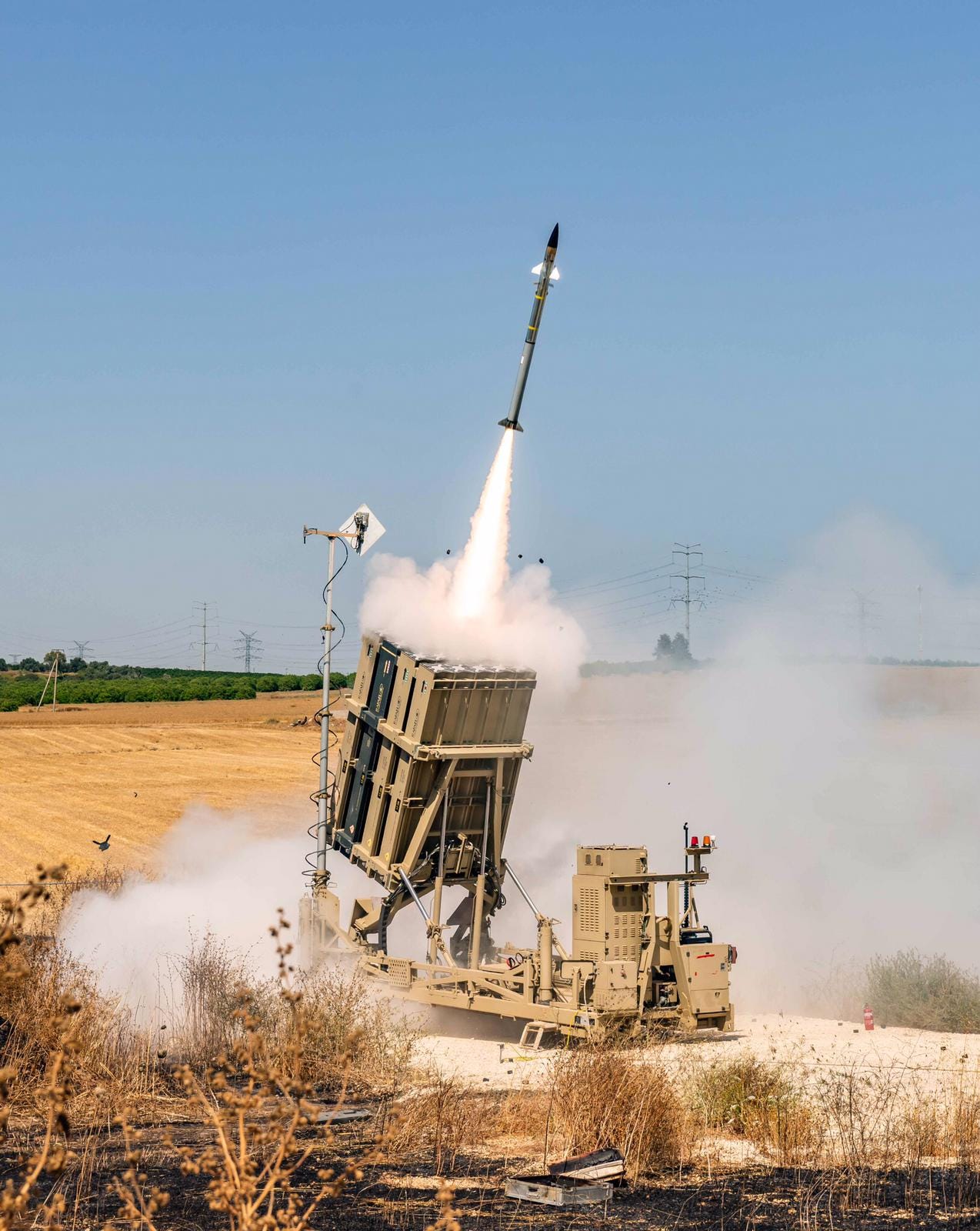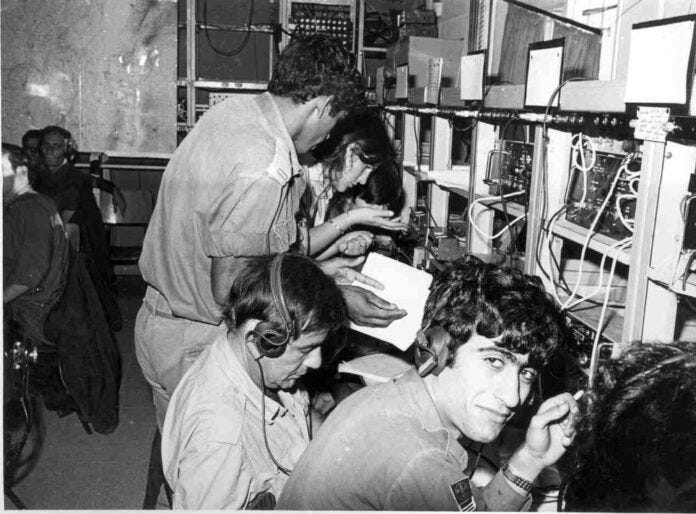The Triumphs and Tragedies of Israel's Unbelievable Innovation
A recent Hebrew-language report revealed that Israel's greatest strength — its mind-bending innovation — appeared to be its greatest weakness in the run-up to October 7th.

Please consider supporting our mission to help everyone better understand and become smarter about the Jewish world. A gift of any amount helps keep our platform free of advertising and accessible to all.
You can also listen to the podcast version of this essay on Apple Podcasts, YouTube Music, YouTube, and Spotify.
I tend to wonder what early Zionist leaders — dating back to the 1800s through the establishment of the State of Israel in 1948 — would think of today’s Jewish country.
I wonder if they would agree (or disagree) that their visions and dreams have come to fruition via an oftentimes tumultuous but equally flourishing nation-state.
I have no doubt that they envisioned Israelis would be successful in fields such as science, technology, medicine, and even innovation. After all, Zionists eradicated malaria from the region in the 1920s, leading to a massive Arab population increase.
It probably would not even surprise them that Israel has the most museums, startups, and film schools per capita.1
But what about Israel’s security and defense apparatus? Who could have foreseen that the Israel Defense Forces (IDF), the Mossad (foreign intelligence and special operations agency), the Shin Bet (domestic security agency), and Aman (military intelligence) would be — by far — the world’s most successful at what they do, pound-for-pound, much less than a century into the State of Israel’s existence?
Israel’s founders did recognize the necessity of having capable, effective security and defense for the survival and security of the state. When Israel declared its independence in 1948, it immediately (within a few hours) faced invasion by five neighboring Arab countries. This context necessitated a strong focus on security and defense capabilities from the outset.
The founders, including Israel’s first prime minister, David Ben-Gurion, prioritized the development of a well-organized, capable defense force to protect the nascent state. But there is a far cry between well-organized and capable — and number one, bar none.
All in all, the purpose of Zionism was to create the State of Israel as a country for the rejuvenation of the Jewish People in our indigenous homeland. Israel’s first and fundamental role is to be a place of refuge for the Jewish People when antisemitic persecution inevitably strikes them around the world.
Zionism’s success depended on Jews returning to the Land of Israel, settling throughout and developing the land, and forming a functioning government. Over the last 75-plus years, it has achieved all of that and more.
Today, the State of Israel is a monumental success. Israel promised the Jewish People security, rejuvenation, and a return to its national destiny — and it has delivered on all these promises. Arab states openly offer Israel peace, ceasing to demand the one-time prerequisite: major compromises on Israel’s side of the Israeli-Palestinian conflict.
This is because the Jews have found a way to develop — pound-for-pound — the world’s strongest, most formidable and respected security and military institutions.
While Israel does not have the largest military in terms of personnel, its emphasis on advanced technology, intelligence, and rapid mobilization has made it one of the most vaunted armies on planet Earth.
Israel consistently allocates a high percentage of its Gross Domestic Product (GDP) to defense. In recent years, it has been approximately 5-to-6 percent of GDP, one of the highest proportions in the world. This percentage is much higher than the global average; most countries spend less than 2 percent of their GDP on defense.
In absolute terms, Israel’s defense budget is substantial, though not among the highest in the world. For instance, in 2023, Israel’s defense budget was around $24 billion. This places it below the leading spenders like the United States, China, Russia, and several European countries, but still high considering its population.
Compared to its regional neighbors, Israel’s defense budget is relatively high. Countries like Saudi Arabia and the United Arab Emirates also have substantial defense budgets, but Israel’s focus on high-tech defense and intelligence capabilities makes its spending particularly effective.
In 2017, for instance, the Mossad created a venture capital fund to invest in high-tech startups that are developing new technologies in cyber, robotics, miniaturization, and encryption, as well as new automated methods of gleaning information from documents and new ways of carrying out operations more stealthily.2
In general, Israel invests heavily in military technology and innovation, contributing to its qualitative military edge. This includes cyber capabilities, high-tech equipment, and advanced missile defense systems like the Iron Dome.
Ten Iron Dome batteries protect the citizens and infrastructure of Israel, with each battery comprising three-to-four stationary launchers, 20 Tamir missiles, and a battlefield radar. Each of the batteries can defend up to 155 square kilometers (60 square miles) and are strategically placed around cities to intercept threats headed toward populated areas. The intelligent Iron Dome system ignores incoming threats that it determines will land in uninhabited areas, thereby minimizing unnecessary defensive launches and lowering operational costs.3
There is also the long-range Arrow-2 and Arrow-3 system, developed by Israel with an Iranian missile threat in mind. It is designed to intercept ballistic missiles outside the earth’s atmosphere, using a detachable warhead that collides with the target, and operates at an altitude that allows for the safe dispersal of any non-conventional warheads.

On a per capita basis, Israel’s defense spending is among the highest in the world. This reflects the significant financial commitment each citizen effectively contributes towards national security.
And the financial burden for everyday Israelis is set to expand: The Finance Ministry is said to have plans for a series of tax changes, including the freezing and lifting of benefits for pension savings and advanced study funds, as it seeks to bring down the large budget deficit and finance the ongoing war with Hamas, Hezbollah and, ultimately, Iran.
Some of Israel’s defense budget is supplemented by military aid from the United States, which has provided billions in assistance over the years.
Having a ton of funding for security and defense has not always been in Israel’s best interest, though.
Once a year, all generations of the heads of the Mossad’s junction division — the division responsible for recruiting and operating agents — gather for a celebratory lunch at the organization’s academy in northern Israel.
There is a regular ritual at these meetings: Each time, each year, the most veteran of them all (who is typically at least 85 years old) stands up and says in rebuke and protest: “But what about Yomint?!” (Yomint is the accepted abbreviation in English for “human intelligence.”)4
In other words: “How do you, the youngsters of the Mossad, neglect the classic profession of recruiting and operating agents who cover the targets and deliver information from the mouth of the enemy, in favor of gathering information through one technology or another?”
And all the other older veterans nod in agreement and look sternly in the youngsters’ direction.
October 7th happened, in large part, because there was not sufficient human intelligence in the Gaza Strip. And Israel did not even need high-quality human intelligence to prevent October 7th. Obviously, it would have been excellent if there had been, say, a brigade or a commander in Hamas who could have given a warning even the night before the attacks.
But something much simpler would also have changed the picture: human intelligence even of the lowest, most basic kind — something that has become a dirty word in Israeli intelligence, according to renowned Israeli investigative journalist and author Ronen Bergman.5
All that was needed is, say, someone who is not a member of Hamas and has no inside information, but who would call and report an unusual occurrence, such as Hamas operatives organizing with motorcycles in a hangar near this informant’s house. Or about another group that suddenly enters the mosque in the middle of the night to pray, a prayer that has no day-to-day logic and explanation.
Such a report was enough for the information to reach the office of the head of the Mossad, and someone would say: “Ahhh, a special operation, the Hamas cell phone SIM cards that suddenly turned on, perhaps this is actually final preparations for an imminent attack.”
How did it happen that Israel’s glorious intelligence community missed the biggest and most brutal attack on the country in some 50 years?
The October 7th debacle is the result of many tactical errors, most of which have already been published, but it was born from a series of strategic failures at the political, military, and intelligence ranks.
According to Ronen Bergman, the problem manifested around a tool for collecting intelligence, a “secret tool” comprised of a cluster of complex and complicated operational and technological projects, which cost many billions of shekels and has one goal: to infiltrate Hamas’ secret capsules.
A long-time senior officer in one of Aman’s collection systems defined it this way: “It’s kind of like knowing where the personal diary of our enemies is, where they write their most hidden secrets. And we can get to this diary secretly and look at what is written there for our own pleasure.”
This is what Israeli intelligence was able to do with the “secret tool” — to review what is happening inside that “diary” and retrieve the secrets written in it. It is a huge achievement, which caused astonishment among the few who were exposed to it. It also often worked and provided excellent intelligence.
But here begins the strategic fault from which this innovation was born. The “secret tool” was so amazing, “absolutely addicting” in the words of a former senior member of the Shin Bet who retired in recent years, that at least as far as Gaza is concerned, the intelligence community neglected, at least to some extent, all other sources.
Why, for example, bother and recruit more field agents, as the elders of the Mossad demanded at every meal? After all, Israel has the “secret tool.” If something happens, it will be revealed through the “secret tool” and the Israelis will know about it immediately.
And so, little by little, the Shin Bet, Aman, the Mossad, and also the top security and political leaders who were exposed to the capabilities of the “secret tool” began to rely on it more and more. At the same time, the importance of other sources had gradually been diminished. If such information did not come from the “secret tool,” it was automatically deemed unimportant.
As one Israeli security official put it:
“You don’t necessarily need to collect thousands of pieces of intelligence from different sources, live, public, visual and technological, as long as you know where your opponent keeps his most hidden secrets and how to get to them. After all, there the enemy reflects reality as it is, without tricks and without hiding. And if you get there, the intelligence that the ‘secret tool’ will bring from there will not be implicit, but at the level of a school equation: simple, readable, understandable, and not subject to interpretations.”
But the penetration into the enemy’s “diary” using this “secret tool” is, of course, exceedingly complex. It requires an extensive series of special operations — some very dangerous, some technological breakthroughs. These are operations that required the cooperation of all intelligence branches and a combination of very advanced technology with particularly daring commando operations.
“The investment was enormous,” said one of the security officials involved, “but when we succeeded, the payoff was much greater.”
“And that’s because we got where we wanted, time after time,” added another senior member of Israel’s intelligence community. “It’s also intelligence that, once we’ve obtained it, it is easy to understand. We no longer need to assemble information from pieces of a puzzle.”
“The belief that it is possible and necessary to go in this direction (to use ‘secret tools’ and invest less in the other intelligence sources) has gradually taken a more central place in the last two decades,” said a senior Shin Bet official. “It grew in tandem with the development of technology, the information revolution, and ultimately the ability to connect from one end of the world to the other. In Israel, it is gaining a place of honor, then a place of priority, and eventually, in some cases, a place of exclusivity. There is also a cultural connection to our becoming a start-up nation and branding ourselves as such, and therefore thinking that technological superiority takes hold everywhere.”
As Ronen Bergman pointed out, it is not only a cultural thing. A large portion of Israel’s security, political, and business elite emanates from the security and defense establishments.
“People whose everything they did in the security system revolved around the use of all kinds of ‘secret tools’ are occupying more and more positions of command and leadership in the State of Israel,” explained an Aman senior officer. “Today, the head of the Mossad, the head of the Shin Bet and their predecessors, the head of the military, the head of the operations division, the chief of staff, the prime minister, and this is only a partial list — they all come from this formation, and most of them at least believe in this concept.”
An intelligence breakthrough like penetrating into places where the enemy keeps his most intimate secrets requires quite a few special operations, but when it happens — and the intelligence pours in — suddenly the other means seem negligible. Human agents, for example.
“As the head of an organization, you would naturally prefer four successful high-tech operations over a hundred exhausting human intelligence operations,” said former Mossad deputy chief Udi Lavie. “Because the ‘secret tool’ is indeed a huge investment, but as soon as you have managed to complete the operation, it closes the target or the intelligence gap. Human intelligence operations? Above all, people are people, and you will always continue to suspect that he might be duplicitous (an agent who is also employed by the enemy).”
It must be emphasized that the Shin Bet did not completely abandon the art of recruiting and operating agents even in the era of the “secret tool.” There were also attempts and operations to bring human intelligence from Gaza, but it became more and more difficult. The recruiters of the agents encountered enormous hurdles.
“After all, Gaza is like one big family of over two million people,” explained a senior official in the Israeli intelligence community.
A U.S. intelligence officer added: “And everyone knows everyone, everything in tremendous density, and with the Batkal (the general security of Hamas, a Stasi-style secret police) that the organization operates to inflict fear and terror on its own citizens. It is difficult to get people out of there (e.g. for meetings with the agents, assignment of tasks) and it is also difficult to establish regular communication channels … without Hamas monitoring them.”
The blindness and complacency due to over-reliance on the “secret tool” kept spreading. In the intelligence community, in the security elite above it, and in the political elite above it, a new arrogant concept began to percolate: “intelligence superiority” — meaning that the State of Israel knows everything about its enemies and, according to an Israeli security source, “no matter what the enemies do or what means of deception or diversion, if they are used — nothing will help them. Israel will know, because in any case the ‘secret tool’ always knows.”
In addition, the Shin Bet and Unit 8200 (the famous IDF Intelligence Corps) did not build what is known as a “warning model.” This is one of the most important lessons from the 1973 Yom Kippur War, but it has probably been forgotten in the last 50 years, according to Ronen Bergman. A “warning model” is a collection of telltale signs that, if all or some of them occur together, there is cause for concern of an impending attack.
How can you build such a warning model? For example, the gathering areas for Hamas’ elite Nukhba forces include mosques, educational institutions, etc. This is a classic telltale sign: If hundreds of Nukhba terrorists arrive at mosques and schools in the middle of the night, something must be going on. What do we do with it? It was necessary to recruit, for example, some low-level field agents, who would signal as soon as they saw such suspicious movement, even someone from the house across the street.
Hamas’ plan also included gatherings in public parks, another telltale sign. If, for example, there were hidden cameras implanted in these parks that know how to turn on a warning light in the control center, when there are too many people at an unusual time, perhaps that would be part of a warning model.
But almost none of this happened. Since Israel has the “secret tool,” why try to recruit an agent near a mosque, or risk a dangerous operation to bury a hidden camera in the middle of a public park in Gaza?
Therefore, when an indicative sign arrived in real-time, like the Israeli SIM cards that were activated by Hamas operatives, no one understood the true meaning, and it was mistakenly attributed to a Hamas exercise, or to the organization’s preparation for an offensive by Israel.
Hamas, on the other hand, actually gave much more credit to Israeli intelligence. They were convinced that Israel has a proven warning model which is being used in Gaza. This is according to internal, highly secretive Hamas documents which Israel seized in Gaza after October 7th.
As such, the terror group conducted experiments to see how Israel reacts. An internal investigative document in the intelligence community, which tried to examine how Israel was surprised by October 7th, stated:
“In the first months of 2023, Hamas carried out a number of exercises designed to simulate the first part of the ground attack, before breaching the fence and penetrating Israeli territory. A force of 2,200 fighters jumped in the territory several times, and since Hamas did not detect intelligence gathering or the movement of IDF forces across the fence, the organization assumed that there was no high alertness on the Israeli side for a major operation of this type.”
A few weeks ago, the retirement letter of Brigadier General Yossi Shariel, commander of Unit 8200, was published. In the letter, Shariel wrote: “It is not possible to rely on a signal warning space (that is, measures such as the ‘secret tool’) … and it is certainly not correct to build on the fact that on the day of command, we will obtain the knowledge of gold.”
There are many reasons for this debacle, and for everything else.
“But above all other reasons,” said a source who is well-acquainted with the intelligence provided by the “secret tool,” self-confidence floated in one central idea: that thanks to Israel’s superior technology, sense of invention, courage, and daring operations, we see the enemy as he is, and nothing can happen to Israel. Nothing significant that the Israelis do not know about.
On October 7th, this significant thing happened — the worst massacre of the Jewish People since the Holocaust. Only this time, the Jews had an army and intelligence and a government. It also had the “secret tool.”
None of them helped.
Unfortunately, the magic of the “secret tool” bewitched Israel’s entire intelligence community. On October 6th, the secrets that the “secret tool” revealed did not signal an imminent war with Hamas — and since the other sources were neglected or not rated as important, Israel was attacked by surprise.
Since October 7th, Israel has rather quickly returned to its overwhelming superiority. And this week the IDF experienced the most successful operational day since October 7th. The damage to Hezbollah’s capabilities — in the scope of their weapons, their power, their accuracy — was one of the best operations carried out by Israel in Lebanon since the terror group’s establishment in 1985.
Even early last week, Israeli Prime Minister Benjamin Netanyahu was quoted alluding to the possibility of killing longtime Hezbollah chief Hassan Nasrallah — which Israel did on Friday night.
These operational successes — there were those in the security establishment who compared them to “Operation Focus” in the 1967 Six-Day War — are the result of many years of diligence. The IDF prepared an entire generation for the Third Lebanon War, following the previous one in 2006. It did not prepare for an invasion by Hamas from the south, but it certainly thought and trained for an invasion by Hezbollah in the north.
The extent of Israel’s intelligence infiltration into Hezbollah is becoming more and more exposed, and these successes have profoundly reduced Hezbollah’s capabilities to make life hell for Israelis.
Recently, Israel’s defense minister spoke about the destruction of tens of thousands of Hezbollah’s rockets — numbers that indicate profuse damage to the most important strategic arm of Iran. The two main strategic threats created by Hezbollah, its precision missiles and plans to invade northern Israel, have been severely degraded.
In addition to the achievements of eliminating Hezbollah’s hardware and infrastructure, Hassan Nasrallah is dead and Israel has assassinated almost all of Hezbollah’s senior command or neutralized them. Their communication lines are also limited following the now-world-famous pager and walkie-talkie attacks two weeks ago.
“It will take a few more days,” one security official said, “but we have taken a big step forward to a different Middle East, where Hezbollah looks completely different and weakened.”
Israel is back to imposing its will on enemies that seek the Jewish state’s destruction. Again, I wonder what early Zionist leaders would think. As we like to say in the Jewish world: Two Jews, three opinions.
ChatGPT
“Israel’s Mossad sets up fund to acquire new spy techniques.” Yahoo.
“Iron Dome System and SkyHunter Missile.” Raytheon.
“תחקיר: "הכלי החשאי" של אמ"ן ושב"כ - שהוביל לזניחת שאר מקורות המודיעין” Ynet News.
“תחקיר: "הכלי החשאי" של אמ"ן ושב"כ - שהוביל לזניחת שאר מקורות המודיעין” Ynet News.




Yep, "the Secret Tool"! The US deep down that path, and it definitely doesn't bode well for us if things go hot. We are in such a shape that we cannot even supply 155mm artillery shells at the rate Ukraine needs them. For over a decade now it's been all about high-end technology. It has a place, but so go the basics.
Well written, Joshua. Thank you.